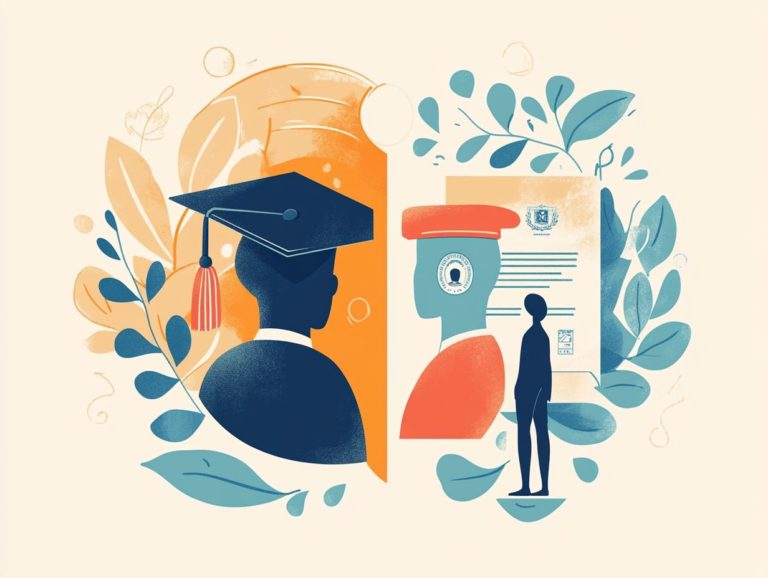5 Key Trends in Educational Certifications for 2024
In today s rapidly changing job market, remaining relevant requires you to adapt to the latest trends in educational certifications. As digital skills soar in importance, the learning landscape is transforming before your eyes.
You ll notice the emergence of online courses and micro-credentials. There is a heightened focus on soft skills as well. These trends present a wealth of opportunities for your personal and professional growth.
This article delves into five key trends shaping educational certifications in 2024, providing you with valuable insights on how to harness these changes for your career advancement.
Contents
- Key Takeaways:
- 1. Increasing Demand for Digital Skills
- 2. Growth in Online Learning and Certifications
- 3. Focus on Soft Skills and Personal Development
- 4. Rise of Micro-Credentials and Digital Badges
- 5. Emphasis on Industry-Specific Certifications
- What Are the Benefits of Pursuing Educational Certifications?
- What Are the Different Types of Educational Certifications?
- How Can Educational Certifications Help with Career Advancement?
- What Are the Key Factors to Consider When Choosing an Educational Certification?
- How Can One Stay Updated with the Latest Trends in Educational Certifications?
- What Are the Potential Challenges of Pursuing Educational Certifications?
- Frequently Asked Questions
- What are the 5 key trends in educational certifications for 2024?
- What is personalized learning and how does it relate to educational certifications?
- What is Personalized Learning?
- How Will Competency-Based Assessments Change Educational Certifications in 2024?
- What Are Digital Credentials?
- What Are Micro-Credentials?
- Will Industry-Specific Certifications Become More Important in 2024?
Key Takeaways:
- Increased demand for digital skills makes educational certifications in this field more valuable than ever before.
- Online learning and certifications continue to grow, making it easier for individuals to access educational opportunities and enhance their skills.
- Soft skills and personal development are becoming a focus in educational certifications, as employers value well-rounded individuals in the workforce.

1. Increasing Demand for Digital Skills
The rising demand for digital skills is transforming the educational landscape. It compels you and your organization to embrace innovative training methods.
By incorporating eLearning, artificial intelligence, and various digital tools, you can significantly enhance learner engagement. This approach addresses the performance challenges prevalent in today s workplaces.
This transformation underscores the necessity of not just acquiring knowledge but also mastering the tools that propel productivity and innovation. As you navigate the swift currents of technological advancement, integrating personalized learning methods that adjust to your needs becomes essential.
By leveraging AI-driven platforms, your training programs can be customized to meet the unique needs of each learner. This ensures that employees acquire relevant skills more efficiently.
These technologies enable you to monitor progress and manage resources effectively. This creates an environment where continuous learning and professional growth can truly flourish.
2. Growth in Online Learning and Certifications
The rise of online learning has transformed the way you pursue certifications. It grants you access to a diverse array of programs from various educational institutions.
With this shift, you can earn micro-credentials that demonstrate your competencies in specific fields. Education has become more adaptable to your personal schedule while expanding access for those who may have previously faced geographical or financial barriers.
Engaging in these online courses provides you with the flexibility to balance work, family, and education effortlessly. Certification programs have become essential tools for tracking your progress and aligning your skills with the ever-evolving demands of the job market.
These micro-credentials act as tangible proof of your achievements. They boost your employability and instill confidence as you explore new career opportunities.
3. Focus on Soft Skills and Personal Development
As the marketplace evolves, you will notice a growing emphasis on soft skills and personal development. This shift has prompted corporate training programs to adopt strategies that enhance learner engagement.
Essential interpersonal skills like communication, teamwork, and emotional intelligence are often as crucial, if not more so, than technical expertise. In today s fast-paced environment, employees with strong soft skills are better equipped to navigate complex workplace dynamics, fostering improved collaboration and innovation.
Training methods such as role-playing, workshops, and mentorship programs have proven effective in weaving personal development into corporate training. These approaches enhance your individual capabilities and contribute to a cohesive and adaptable workforce, ultimately benefiting the overall performance of the organization.
4. Rise of Micro-Credentials and Digital Badges
The rise of micro-credentials and digital badges is revolutionizing how you demonstrate your skills and competencies. These innovative tools offer a flexible and accessible approach to recognition, perfectly aligning with the changing world of credentials.
These badges are a testament to your commitment to lifelong learning and skill enhancement. In a world where traditional degrees often struggle to showcase specific abilities, micro-credentials break down your skill sets into easily verifiable units.
This shift allows you to curate your educational narrative while enhancing the visibility of your achievements in professional settings. As organizations increasingly recognize the value of these digital credentials, they pave the way for a dynamic workforce where practical skills take center stage alongside traditional qualifications.
5. Emphasis on Industry-Specific Certifications
There’s an increasing focus on industry-specific certifications that provide targeted skills training, such as unique educational certifications to boost your career, equipping you with the competencies needed to excel in your field and elevate your professional development.
In today s fast-paced job market, these credentials bridge skill gaps and align with what employers actively seek. Many sectors prioritize candidates who have completed these programs, viewing them as evidence of your commitment to continuous learning.
Educational institutions play a pivotal role in this landscape, crafting specialized certification courses that reflect industry needs. This relationship between educational providers and industry requirements cultivates a skilled workforce, ready to tackle contemporary challenges and promote career advancement, including the most popular business certifications in 2024.
What Are the Benefits of Pursuing Educational Certifications?

Pursuing educational certifications presents a wealth of benefits:
- Enhanced learner engagement
- Improved skills training
- Significant opportunities for professional growth
This journey fosters a culture of lifelong learning within you. In today’s competitive job market, these certifications are invaluable assets that significantly boost your employability. By equipping you with in-demand skills sought by many employers, you position yourself as a standout candidate.
Obtaining these credentials often unlocks extensive networking opportunities, allowing you to connect with industry leaders and like-minded peers. This opens doors to exciting mentorships and collaborations, enriching your career journey.
Staying updated through certifications ensures you keep pace with evolving industry trends. This adaptability is essential for your career advancement.
Don’t miss out on the chance to improve your skills and stand out in the job market!
What Are the Different Types of Educational Certifications?
Educational certifications come in various forms, from traditional degrees and diplomas to modern micro-credentials and specialized programs designed to meet specific industry needs. These certifications serve different purposes and cater to diverse learning paths.
An associate degree typically provides foundational knowledge for entry-level positions. In contrast, a bachelor’s degree delves deeper into a field of study, preparing you for more advanced roles.
On the flip side, micro-credentials are ideal if you’re looking to upskill quickly, focusing on specific competencies that are highly relevant in today s fast-paced job market.
As a professional, you might seek certifications such as project management or teaching credentials, which are essential for career advancement or professional licensure.
Understanding these options helps you make better choices for your career and educational goals.
In summary, pursuing educational certifications can significantly enhance your skills, employability, and professional opportunities. Consider exploring 5 notable marketing certifications for 2024 to embrace the journey of learning and take the next step in your career!
How Can Educational Certifications Help with Career Advancement?
Educational certifications are important for your career advancement. They serve as a testament to your skills and knowledge.
They enable you to distinguish yourself in a competitive job market. Certifications open the door to new professional development opportunities.
When you invest in certifications relevant to your field, you demonstrate a commitment to your career. This enhances your resume, making it more attractive to potential employers.
These credentials reflect your dedication to continuous learning, a quality that is highly prized across many industries. Having the right certifications can unlock job prospects that you may have thought were out of reach.
As you acquire specialized knowledge, you position yourself as a prime candidate for promotions and salary increases. This can significantly influence your long-term career trajectory.
What Are the Key Factors to Consider When Choosing an Educational Certification?
When selecting an educational certification, consider key factors such as industry relevance and learning outcomes. For instance, exploring the most in-demand IT certifications in 2024 ensures that the certification aligns with your career aspirations.
You should evaluate the accreditation status of the program. This significantly impacts its credibility and recognition in the job market.
The rigor and comprehensiveness of the curriculum are also vital. You want to be certain that the topics covered are both current and applicable to real-world scenarios.
Assessing how well the program aligns with your long-term professional goals is essential. Seek out certifications that enhance your current skill set and lay the groundwork for future advancement.
How Can One Stay Updated with the Latest Trends in Educational Certifications?
Staying updated with the latest trends in educational certifications is essential for you. For example, exploring the top 5 healthcare certifications for 2024 equips you to adapt to evolving industry standards and ensures your skills remain relevant.
Engaging in professional development courses provides targeted knowledge that aligns with current demands. Participating in webinars allows you to connect with experts and gain insights into real-time innovations.
Subscribing to industry publications can also be immensely beneficial. These resources showcase emerging trends, case studies, and best practices that enhance your understanding of educational standards.
By leveraging these methods, you can enrich your expertise. This positions you as an informed leader in your field.
What Are the Potential Challenges of Pursuing Educational Certifications?
Pursuing educational certifications comes with benefits, but you may encounter challenges. These include managing your time effectively and dealing with financial constraints.
These obstacles can feel overwhelming, especially when juggling work, family responsibilities, and your study commitments. Time management can be a major challenge that feels daunting!
To combat this, it s crucial to develop a well-structured schedule that prioritizes your tasks. Include dedicated study blocks and well-deserved breaks to recharge.
For financial constraints, explore scholarship opportunities or flexible payment plans that many institutions offer. Maintaining your motivation is key.
You can achieve this by setting realistic goals, celebrating small victories, and connecting with a community of like-minded peers. This creates a robust network of support to help you navigate your journey.
Frequently Asked Questions

What are the 5 key trends in educational certifications for 2024?
The 5 key trends in educational certifications for 2024 include personalized learning, competency-based assessments, digital credentials, micro-credentials, and industry-specific certifications.
What is personalized learning and how does it relate to educational certifications?
Personalized learning tailors educational experiences to individual needs and preferences. This approach enhances the effectiveness of educational certifications by ensuring they meet learners’ specific skills and career goals.
What is Personalized Learning?
Personalized learning customizes education to fit each student’s needs and interests.
This means certifications will be tailored to the specific skills each learner needs.
How Will Competency-Based Assessments Change Educational Certifications in 2024?
Competency-based assessments measure actual skills, not just test scores. They will emphasize practical skills over academic achievements.
What Are Digital Credentials?
Digital credentials are online certifications or badges that prove your skills. By 2024, they will replace traditional paper certificates and become widely accepted.
What Are Micro-Credentials?
Micro-credentials are specialized certifications focusing on specific skills. In 2024, they will help individuals quickly gain targeted skills without lengthy programs, reflecting trends in IT certifications.
Will Industry-Specific Certifications Become More Important in 2024?
Absolutely! Industry-specific certifications will be crucial as employers look for candidates with in-demand skills.
These certifications will cater to specific job roles, enhancing career prospects.







